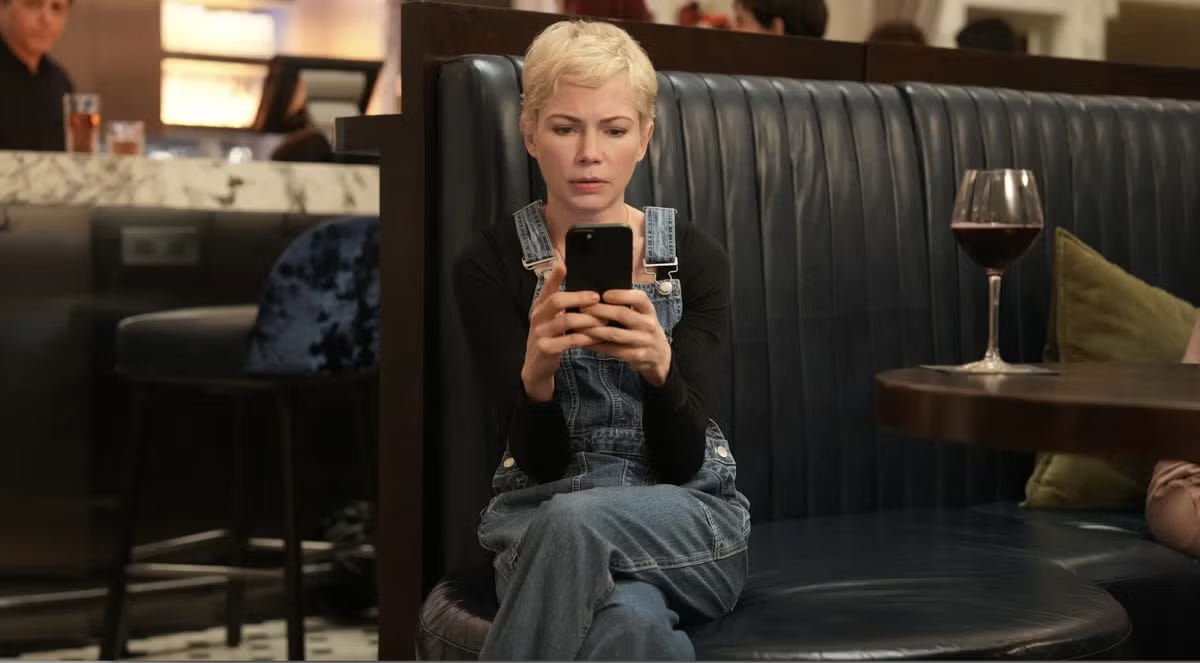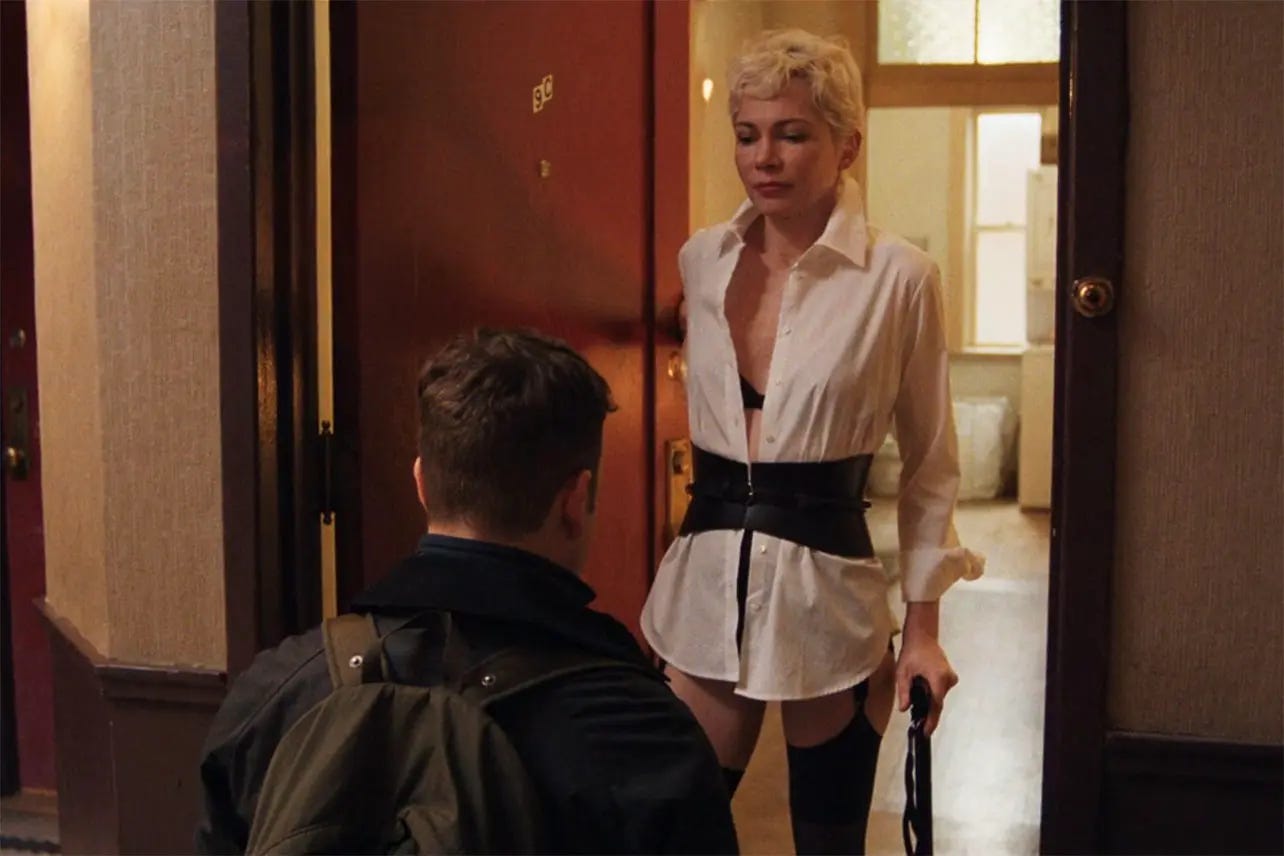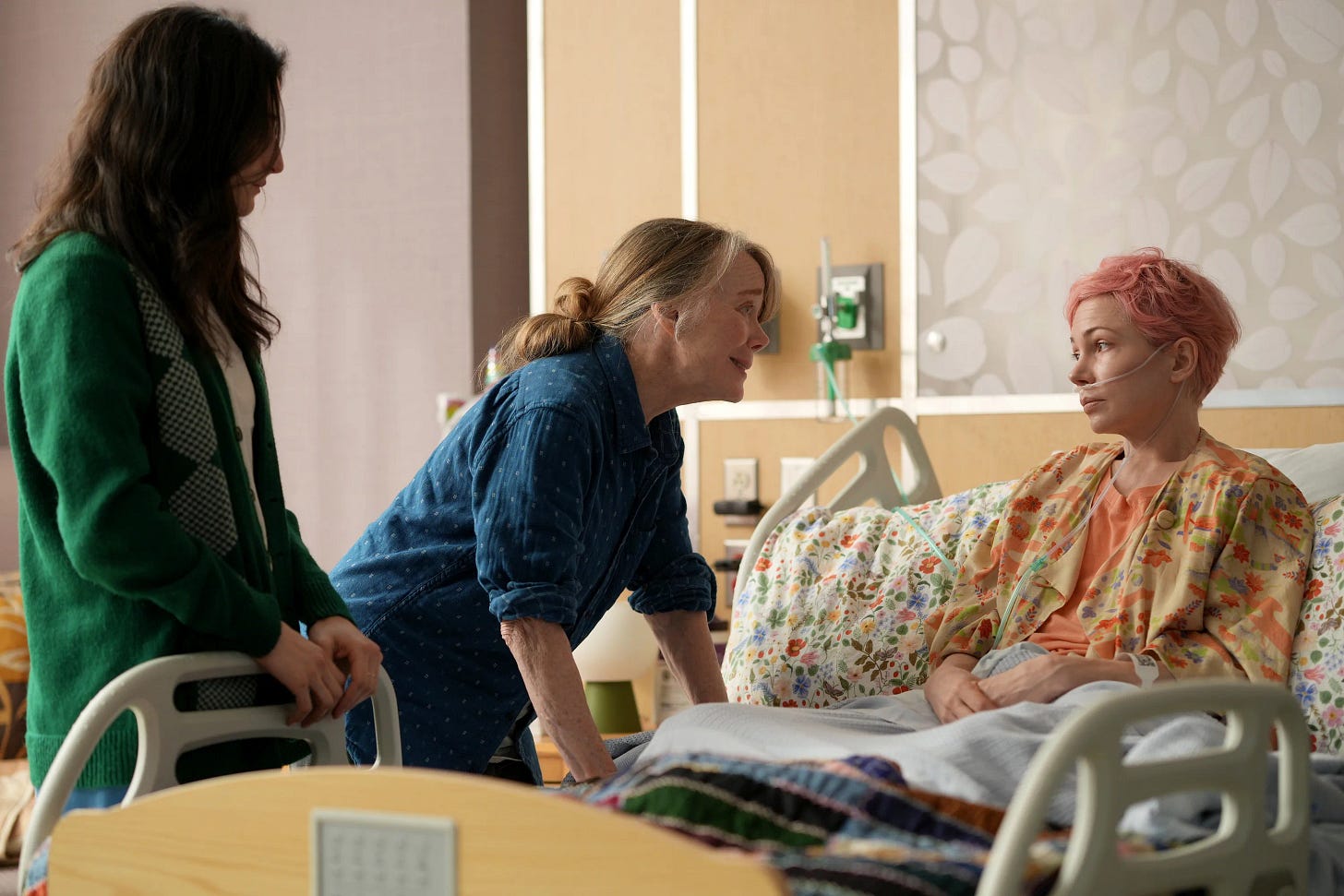How 'Dying for Sex' helped me deconstruct purity culture
The opposite of purity culture isn't sex. It's sovereignty.
I really don’t want to talk about my sex life on the internet, but I do want to talk about Dying for Sex.
Hulu’s Dying for Sex stars Michelle Williams as Molly, a 40-something woman who is diagnosed with terminal breast cancer and immediately calls her best friend (Jenny Slate), ends her sexless marriage, and downloads kink-forward dating apps to explore her desires. What ensues is a raucous, wracking exploration of pleasure, power, and embodiment.
I thought this show would be a fun romp. I’m a Jenny Slate completionist, after all. And I was right! The dark comedy is pitch-perfect, the characters are complex and hilarious, and the layered relationship between best friends Nikki and Molly brought me to tears. Molly attends a sex party potluck, discovers domming, and gleefully and consensually kicks her neighbor (Rob Delaney) in the—listen, you just need to watch this show.
What I didn’t expect, however, was how this show would fundamentally reshape the way I think about pleasure, power, and mortality.
When we meet Molly in Dying for Sex, she has spent her entire life disconnected from her body and emotions. From childhood trauma to years of clinical dehumanization as a cancer patient, she learned dissociation as a tool for survival.
Though the facts of our stories are radically different, I was surprised by how much of myself I saw reflected back in Molly’s experience.
In my world, death and sex have always been connected, but in a different way than in Molly’s.
I grew up evangelical, in the Southern Baptist church, at the height of the commercialized purity culture movement: True Love Waits, promise rings, and pieces of tape passed around youth group circles until they were no longer sticky.
According to church teachings, our bodies were the root of all wickedness: “If you live according to the flesh, you will die” so we must “put to death what is earthly in you” and “crucify the flesh, with its passions and desire.”
The violence of the language made one thing clear: My body and its desires were a problem punishable by death.
It’s no wonder, then, that I—and a generation of people just like me—learned to systematically detach from our bodies. Ask anyone who grew up in purity culture and you’ll hear the same baggage. A lifetime of associating sex with punishment, eternal damnation, and death isn’t exactly easy to rewrite on your wedding night, or after.
I started seeing a new therapist recently. In our intake session, she asked about trauma. No, I told her, just a run-of-the-mill religious upbringing. She paused, then gently offered me this:
“I want to tell you that, in therapeutic circles, purity culture is now viewed as a form of sexual abuse because of the hyper-fixation on sex and the bodies of children.”
When she said that, I immediately burst into tears. Her words named a feeling that existed deep in my body—a feeling, like most feelings, which I’d long buried.
The sense of loss that arose in me wasn’t just about sex or pleasure. It was about all the years that I had believed that my body could not be trusted. I thought I’d deconstructed the ways that purity culture had messed me up. But I didn’t realize the immense sense of powerlessness it implanted in me: a deep-down idea that my body was not mine, and neither was my life.
It wasn’t just that purity culture took sex from me—it’s that it took power. It severed my connection to my own intuition. Which is to say, to myself.
When I told my friends about my therapist’s revelation, I watched them have the same reaction I did: Relief at finally having that experience validated. Grief for the years we’d cut off access to these enormous and important parts of ourselves. Rage at the ways we had been robbed of self-trust for so long.
The purity culture teachings and calls to die to ourselves weren’t about desire. They were about systematically killing my ability to trust my own judgment, intuition, and bodily wisdom, transferring power away from our inner knowing to an outside authority figure.
This wasn’t an accident, of course. It was a way of neutralizing our individual and collective power. For women especially, access to that inner knowing is an existential threat to the existing order. It beckons us beyond the status quo. The doctrine of purity culture was the perfect solution, then, effectively silencing that inner voice that might have said, “There is more for you, and it’s yours for the taking.”
In purity culture, we were always waiting. For someone to tell us what to do. For marriage. For heaven. For death, where we’d receive the joy we’d put off for so long. If we could just wait a little longer, we would get everything we wanted. All we had to do was push satisfaction until after death.
But the thing about waiting, whether it's for pleasure or heaven or life or death, is that it’s an inherently powerless position. It requires you to suspend your own sovereignty.
What’s so radical about Molly’s arc is seeing her stop waiting—for someone to tell her what she wants, for pleasure, for power, for compassionate medical care, for what she needs. She takes her power into her own hands. Literally, as a dom, but outside of sex too.
When her doctor tries to treat her like a data point, she insists on her own humanity by asking him to sit beside her and hold her hand. When her ex-husband or mother violate her boundaries, she no longer tolerates it. When she wants something, she says it—and gets it.
We see Molly shed her self-consciousness, risk aversion, and the fantasy that the fulfillment of her desires could be pushed off to “one day” in the future. Faced with the undeniable fact of her mortality, Molly doesn’t have time to wait. Fulfillment of her desires must happen now, in this body and this life.
For Molly, death made life urgent. Her terminal cancer diagnosis sharpened her desire to more completely inhabit her body and her life in the time she has remaining. Joseph Campbell calls this a longing to experience not “the meaning of life” but “the rapture of being alive.” This is different from feeling good all the time. Instead, it’s about feeling all of it, the full spectrum of existence, sensation, and emotion.
I had spent so long feeling so little, disconnected from my body and intuition, as a result of what I’d been taught in church. I learned to vacate myself in order to stay holy; in doing so, I was cut off from the very place where the sacred resides.
At a time when Molly’s body seemed to be turning on her, she decided to sink into it rather than vacate it. (There’s a scene in the backroom of what appears to be a Crate & Barrel that I will think about for many years to come.) Molly learns to stay in her body—not dissociating, but staying present and engaged. She is determined to reconnect with herself, despite it all: the trauma, the illness, the discomfort. She re-enters and re-embodies herself, reclaiming her power after a lifetime of doing otherwise.
Molly’s exploration of sex and pleasure is fundamentally a reclamation of personal power. That’s why this show hit me so hard. In Dying for Sex, I saw someone taking back control of her own story, body, and choices.
…so you’re telling me that’s possible?
Since finishing the show (and original podcast), I’ve been thinking a lot about the transformative potential of pleasure as a pathway to reclaiming personal sovereignty.
When I say pleasure here, I don’t just mean sex. I’m using Audre Lorde’s definition of the erotic as a capacity-expanding experience of joy:
“And that deep and irreplaceable knowledge of our capacity for joy comes to demand from all of my life that it be lived within the knowledge that such satisfaction is possible and does not have to be called marriage, nor god, nor an afterlife.”
As Lorde writes: “In touch with the erotic, I become less willing to accept powerlessness.”
This is what we see Molly do in Dying for Sex. It’s what I’m doing as I deconstruct and untangle stubborn old teachings that told me my desires were wicked, my body could not be trusted, and satisfaction must be put off until after death.
I have reclaimed my personal agency in many different ways, documented here on Second Rodeo: upending my living situation, traveling alone, renegotiating my relationship with alcohol, getting strong, choosing not to have children, talking to strangers, and even flirting.
These acts of personal agency, small or large, remind me that this is my life. I don’t need to wait for permission. I can inhabit myself fully, right now. In fact, in healing the damage of past religious trauma, that is one of the most radical things I can do.
Perhaps one of the biggest ways I’ve reclaimed power (that I’m willing to discuss on the internet) is through writing.
In Dying for Sex, kink offers Molly a safe container to confront long-held trauma, break old patterns, find her voice, and access her full self. For me, writing has done the same.
Personal narrative, like subversive sex, requires radical presence. Both create a space for understanding and rewriting the past. Both allow us to access the erotic—that expanded capacity for feeling, the rapture of being alive—and reclaim the power that’s been ours all along.
I’m unwilling to accept powerlessness anymore. The opposite of purity culture isn't sex. It's sovereignty.
•••
Love,
Lane 💋








I just finished this show and thoroughly enjoyed your analysis. You hit the nail on the head with how you framed the urgency that life took on for Molly. I wish more people realized that life is always urgent—we never know when our time will come. Also, we would all be so lucky if only to all have a best friend like Nikki- talk about true friendship. They were women together.
The severing of your body from your knowledge is so insidious. It sets up the potential for abuses and harms of all kinds.